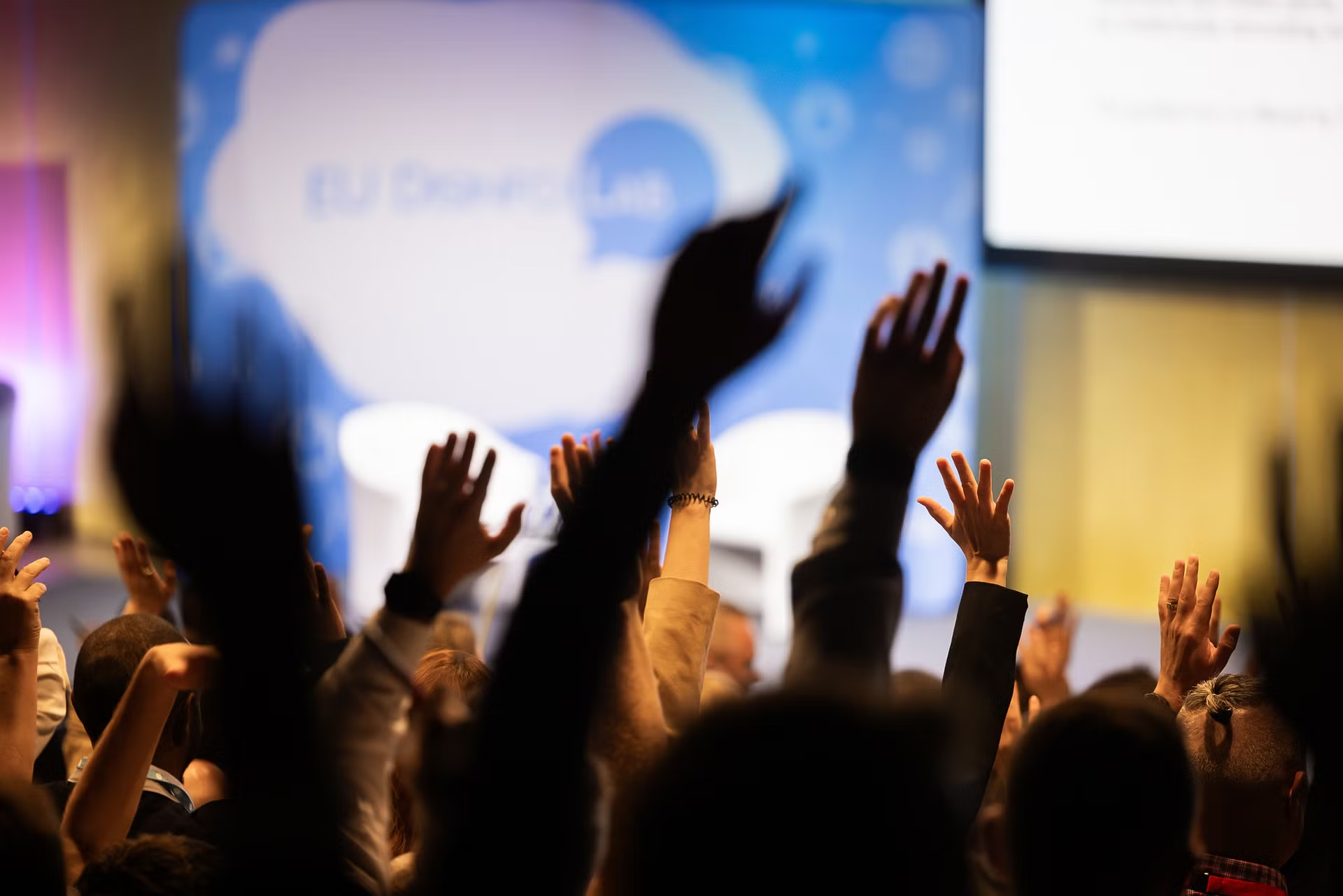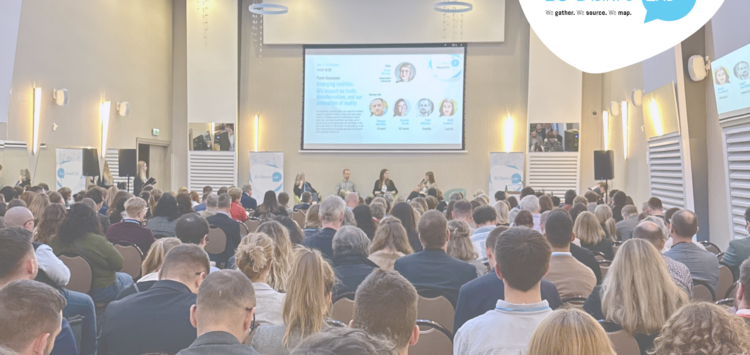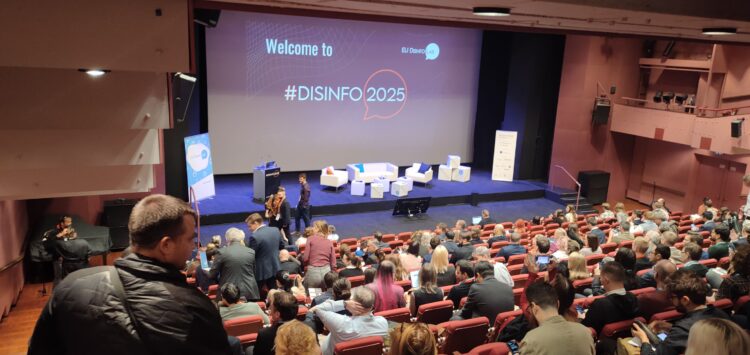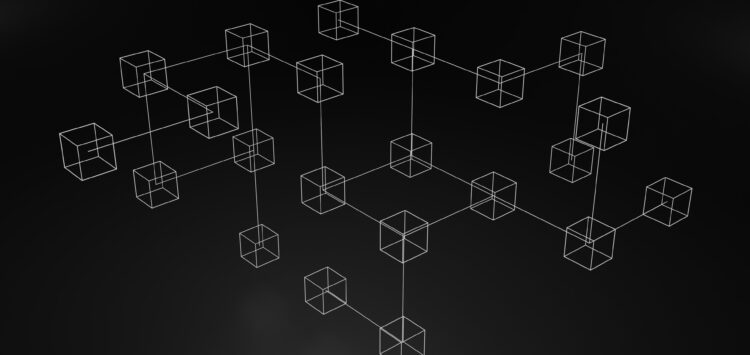EU DisinfoLab 2024 conference: our key takeaways from #Disinfo2024
In an ever-evolving digital landscape, EU DisinfoLab serves as a vital hub for our community of actors striving for a safer online environment. The civil society community, policymakers, platforms representatives and regulators gathered in Riga, Latvia, on October 9 and 10 for two days of discussions centered around all the aspects of disinformation.
Diana Wallis from EU DisinfoLab opened this year’s edition to a full room, underscoring the growing relevance of the conference. With over 900 applications received, 583 participants attended, highlighting the increasing interest in our field. This conference provided an opportunity for reflection during a unique election year, which saw the largest democracy in the world, India, vote, alongside nearly half of the global population.
This year has been marked by coordinated disinformation campaigns, the rise of populism, domestic polarization, political violence and AI-generated content. The urgent call for transparency and accountability from major platforms is more needed than ever. As our co-founder Amaury expressed in his talk, “Transparency just for the sake of transparency is not enough; what we need is accountability from big tech platforms.” Let’s also not forget the need for an ethical OSINT framework. As we’re approaching the US presidential elections, here are some key lessons learned in Riga from our peers.
Local means to global issues
One of the prevailing themes from the panels was the necessity for those fighting disinformation to tailor their approaches to their specific audiences. Dr Hamza Al-Kateab (Doctor & Activist, Action For Sama) from Syria drew attention to this during a panel discussion, stating, “Whatever you’re doing, focus on the narrative and the importance of local voices.” This serves as an essential guideline for all of us. Paula Gori from EDMO highlighted the importance of media literacy programs in all EU languages. Local voices reflect local realities, as noted by Frédéric Alinabo Namegabe from Balobaki Check (Democratic Republic of Congo), where internet access and electricity cannot be taken for granted. In a country with over 200 spoken languages, the importance of translating content is immense. He reminded the audience that news can be disseminated through community radio, local influencers. This emphasis on local channels, such as community radios in Africa, was noted by UN Under-Secretary-General for Global Communications Melissa Fleming in her keynote address.
Learning from each other: the importance of collaboration
Joining forces at every level is essential. Paula Gori from EDMO urged us to “bring other people into this room,” transcending geographical and sectoral boundaries. This humble observation was shared by Rachele Gilman of FIMI ISAC, who pointed out that collaboration includes sharing tools and strategies with smaller organisations. In the same panel, our co-founder Amaury advocated for increased collaboration, stating, “We must engage with fact-checkers, big tech, and policymakers.” He also highlighted the need for substantial funding to develop accessible software for the majority.
Addressing FIMI at large
“It’s not just Russia; there are also Iran, China, and Brazil,” reminded Vice President of the European Commission for Values and Transparency Věra Jourová during her speech. “The enemy is playing on our playground … The enemy is strong and persistent, we must be stronger and more persistent.” She stressed the importance of anticipation regarding disinformation campaigns: “so far, we have been slower.”
Some panels focused on niche disinformation campaigns, such as those targeting food. Pragnya Senapati from Ripple Research described a “weaponization of food,” where narratives seek to dissuade people from reducing meat consumption, despite its environmental benefits. Rocío López Iñigo from the World Health Organization’s Africa Infodemic Response Alliance discussed vaccine misinformation, noting that while this issue is not new, the phenomenon of infodemics introduces new challenges. Their work involves understanding the information landscape and identifying preferred sources in a specific information context.
The chain of responsibility against false narratives
Everyone has a role to play in combating false narratives. The crucial role of communication and public relations in disseminating the truth is often overlooked and deserves more recognition. Ukrainian communication specialist Olha Danchenkova of Calibrated Agency presented the PR Army project, a Ukrainian independent nonprofit organisation formed early in the Russian invasion of Ukraine. This initiative of communications and PR specialists strives to bridge the gap between Western media and trustworthy Ukrainian voices. They have created a database of verified experts and a “Check the Speaker” tool to ensure authentic voices are heard in the media outlets across the globe.
The importance of this chain of responsibility was also underscored by the reporter Jack Brewster, who created (for an article) a fake local news website using AI generated content. He was shocked by how easily he could generate misleading content and mentioned that the freelance developer he hired did not hesitate to assist him. After the scam was exposed, the developer did not express remorse; instead, he thanked Brewster and reported a boom in business. The ripple effect of our choices, small or big, cannot be denied.
Regulation/legal action
In this “chaos online,” as described by researcher Benjamin Shultz from the American Sunlight Project, the necessity for regulation is undeniable. Věra Jourová advocated for judicial actions against foreign interference whenever possible, asserting that this approach can be more effective than the Digital Services Act (DSA). Regarding regulation, EU DisinfoLab announced its first policy event in Brussels from March 18 to 19, 2025, focusing on regulatory enforcement. Registration will open in December.
Remembering who we work for: the public
Let’s not forget who we are working for: the public. “It’s unfair to transfer all the responsibility to the citizens,” said Melissa Fleming, and she is absolutely right. Maria Giovanna Sessa from EU DisinfoLab highlighted the importance of digital and media literacy. Věra Jourová and Melissa Fleming both paid tribute to the culture of MIL in our home country, Finland.
We learned a great deal during these two days. As one participant said in a hallway, EU DisinfoLab conference is not merely a series of presentations; it’s a multi-layered event that provides an opportunity to reflect on the state of our societies and democracies. It encourages each of us to raise the bar in our work. With such an inspiring experience behind us, we’re already looking forward to the next conference, scheduled for October 15 and 16, 2025, in Ljubljana, Slovenia.
Photo credit: EU DisinfoLab / Reinis Olins




